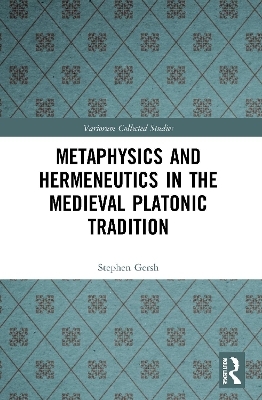
Metaphysics and Hermeneutics in the Medieval Platonic Tradition
Seiten
2023
Routledge (Verlag)
978-0-367-61140-8 (ISBN)
Routledge (Verlag)
978-0-367-61140-8 (ISBN)
This book consists of twelve essays dealing with main trends and specific figures within the medieval Platonic tradition. It will be of special interest to students of the classical tradition in western thought, and more generally to students of medieval philosophy, theology, history, and literature.
Metaphysics and Hermeneutics in the Medieval Platonic Tradition consists of twelve essays originally published between 2006 and 2015, dealing with main trends and specific figures within the medieval Platonic tradition.
Three essays provide general surveys of the transmission of late ancient thought to the Middle Ages with emphasis on the ancient authors, the themes, and their medieval readers, respectively. The remaining essays deal especially with certain major figures in the Platonic tradition, including pseudo-Dionysius the Areopagite, Iohannes Scottus Eriugena, and Nicholas of Cusa. The principal conceptual aim of the collection is to establish the primacy of hermeneutics within the philosophical program developed by these authors: in other words, to argue that their philosophical activity, substantially albeit not exclusively, consists of the reading and evaluation of authoritative texts. The essays also argue that the role of hermeneutics varies in the course of the tradition between being a means towards the development of metaphysical theory and being an integral component of metaphysics itself. In addition, such changes in the status and application of hermeneutics to metaphysics are shown to be accompanied by a shift from emphasizing the connection between logic and philosophy to emphasizing that between rhetoric and philosophy. The collection of essays fills in a lacuna in the history of philosophy in general between the fifth and the fifteenth centuries. It also initiates a dialogue between the metaphysical hermeneutics of medieval Platonism and certain modern theories of hermeneutics, structuralism, and deconstruction.
The book will be of special interest to students of the classical tradition in western thought, and more generally to students of medieval philosophy, theology, history, and literature. (CS1094).
Metaphysics and Hermeneutics in the Medieval Platonic Tradition consists of twelve essays originally published between 2006 and 2015, dealing with main trends and specific figures within the medieval Platonic tradition.
Three essays provide general surveys of the transmission of late ancient thought to the Middle Ages with emphasis on the ancient authors, the themes, and their medieval readers, respectively. The remaining essays deal especially with certain major figures in the Platonic tradition, including pseudo-Dionysius the Areopagite, Iohannes Scottus Eriugena, and Nicholas of Cusa. The principal conceptual aim of the collection is to establish the primacy of hermeneutics within the philosophical program developed by these authors: in other words, to argue that their philosophical activity, substantially albeit not exclusively, consists of the reading and evaluation of authoritative texts. The essays also argue that the role of hermeneutics varies in the course of the tradition between being a means towards the development of metaphysical theory and being an integral component of metaphysics itself. In addition, such changes in the status and application of hermeneutics to metaphysics are shown to be accompanied by a shift from emphasizing the connection between logic and philosophy to emphasizing that between rhetoric and philosophy. The collection of essays fills in a lacuna in the history of philosophy in general between the fifth and the fifteenth centuries. It also initiates a dialogue between the metaphysical hermeneutics of medieval Platonism and certain modern theories of hermeneutics, structuralism, and deconstruction.
The book will be of special interest to students of the classical tradition in western thought, and more generally to students of medieval philosophy, theology, history, and literature. (CS1094).
Stephen Gersh is Emeritus Professor of Medieval Studies at the University of Notre Dame, USA.
1. Ancient Philosophy becomes Medieval Philosophy 2. Philosophy and Humanism 3. The First Principles of Latin Neoplatonism 4. Non-Discursive Thinking in Medieval Platonism 5. The Pseudonymity of Dionysius the Areopagite and the Platonic Tradition 6. Dionysius’ On Divine Names and Proclus’ Platonic Theology 7. Eriugena’s Fourfold Contemplation 8. Eriugena and the Order of the Primordial Causes 9. Eriugena and Heidegger: An Encounter 10. Nicholas of Cusa and the Historical Plato 11. Nicholas of Cusa’s Rewriting of the Anselmian Proslogion 12. Nicholas of Cusa as Summation and Singularity
| Erscheinungsdatum | 22.12.2022 |
|---|---|
| Reihe/Serie | Variorum Collected Studies |
| Verlagsort | London |
| Sprache | englisch |
| Maße | 156 x 234 mm |
| Gewicht | 500 g |
| Themenwelt | Geschichte ► Allgemeine Geschichte ► Vor- und Frühgeschichte |
| Geschichte ► Allgemeine Geschichte ► Altertum / Antike | |
| Geschichte ► Allgemeine Geschichte ► Mittelalter | |
| Geisteswissenschaften ► Philosophie ► Philosophie Altertum / Antike | |
| Geisteswissenschaften ► Philosophie ► Philosophie des Mittelalters | |
| ISBN-10 | 0-367-61140-6 / 0367611406 |
| ISBN-13 | 978-0-367-61140-8 / 9780367611408 |
| Zustand | Neuware |
| Informationen gemäß Produktsicherheitsverordnung (GPSR) | |
| Haben Sie eine Frage zum Produkt? |
Mehr entdecken
aus dem Bereich
aus dem Bereich
Was Pompeji über uns erzählt
Buch | Hardcover (2023)
Propyläen (Verlag)
CHF 44,75
auf den Spuren der frühen Zivilisationen
Buch | Hardcover (2023)
C.H.Beck (Verlag)
CHF 27,95


